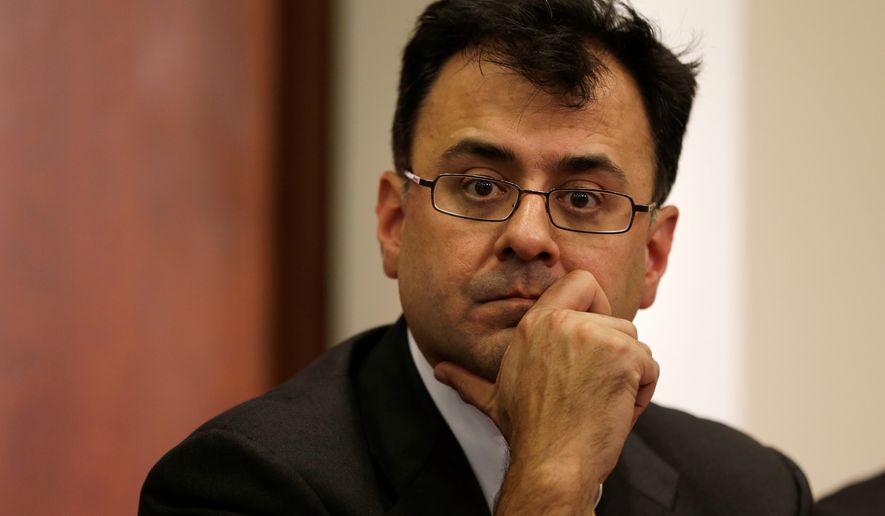A top Google executive refused repeatedly Tuesday to commit to a third-party audit under tough questioning from Senate Democrats on privacy and Senate Republicans on censorship and anti-conservative bias.
Karan Bhatia, Google vice president of global government affairs and public policy, demurred when pressed by senators to undergo an independent audit of the company’s content management practices, as both Facebook and Twitter have done, saying his company is in a “very different situation.”
“I’m not sure a single audit of the entirety of what our guidelines and policies are would be viable,” he told the Senate Judiciary subcommittee on the Constitution.
Sen. Josh Hawley, Missouri Republican, was clearly frustrated, telling Mr. Bhatia that “trust and patience with your monopoly have run out, and it’s certainly run out with me,” while Sen. Richard Blumenthal, Connecticut Democrat, warned that the clock was ticking on the Senate’s patience with Big Tech.
“You can’t simply unleash the monster and say it’s too big to control,” Mr. Blumenthal said. “You have a moral responsibility, even if you have that legal protection. Again, with all due respect, I think there is a moral imperative here, and the hourglass has run out.”
Mr. Bhatia also denied Silicon Valley investor Peter Thiel’s suggestion that the Chinese government may have infiltrated Google — “Absolutely not,” he said — an allegation that prompted President Trump to tweet Tuesday that his administration would “take a look!”
Google, which pulled out of China in 2010, has also canceled plans for Project Dragonfly, a search engine subject to Chinese government censorship, according to Mr. Bhatia.
“We have terminated that,” said Mr. Bhatia, prompting Mr. Hawley to respond, “I’m glad to hear you say that Project Dragonfly has been canceled. I think that’s news.”
The hearing, marked by fiery exchanges between combative lawmakers and the evasive executive, began with a gotcha moment: Chairman Ted Cruz unveiled an internal Google document titled, “The Good Censor: How Can Google Reassure the World that It Protects Users from Harmful Content While Supporting Free Speech?”
The March 2018 document said tech companies are performing a “balancing act between two incompatible positions,” namely “an unmediated marketplace of ideas/100% commit to the American tradition that prioritizes free speech” and “well-ordered spaces for safety and civility/100% commit to the European tradition that favors dignity over liberty.”
Mr. Cruz said that the European model had won out on social media platforms, according to the document, which said, “Tech firms have gradually shifted away from unmediated free speech and toward censorship and moderation.”
Asked whether Google were engaging in censorship, Mr. Bhatia said, “I would not say that we are censorship speech on our platform,” citing the “remarkable opportunities” for participants across the political spectrum.
“We do have community guidelines that preclude, for instance, people from uploading videos that might contain violent extremism, that might contain hate speech that would prescribe or encourage [or] incite violence against protected minorities,” he said.
Mr. Bhatia also said that the document was “sort of a thought experiment” by the marketing team, adding that, “It’s not reflective necessarily of the views of the company as a whole.”
The hearing’s topic was “Google and censorship,” a topic near and dear to conservatives, who have long accused the company of bias on its search engine, news sites, and YouTube, which is owned by Google.
Sen. Mazie Hirono of Hawaii, the panel’s ranking Democrat, dismissed the right’s bias concerns, describing the hearing as “Groundhog Day,” and blamed conservatives for making it more difficult for social media companies to remove objectionable content.
“This tilting at windmills comes at a cost,” said Ms. Hirono. “Fears of being tarred as biased have made tech companies hesitant to deal with the real problems of racist and harassing content on their platforms.”
Mr. Cruz said that almost 90% of U.S. searches are conducted through Google, and 88 of the company’s executives donated in 2016 to the Hillary Clinton presidential campaign. How many supported the Trump campaign? “Zero,” he said.
Mr. Bhatia insisted that the search engine was unbiased — “We construct it, we build it and we operate it to be politically neutral” — and Google receives complaints of bias from both ends of the political spectrum.
“Operating on the scale that we do, we’re bound to get criticism from both sides, and we do,” Mr. Bhatia said.
• Valerie Richardson can be reached at vrichardson@washingtontimes.com.




Please read our comment policy before commenting.